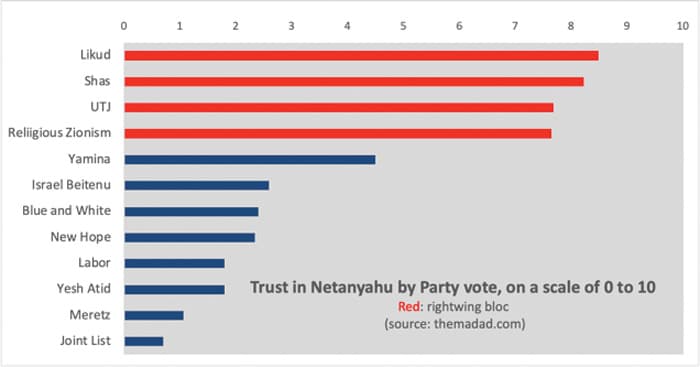 Shimon Peres shake hands with Collette Avital on June 13, 2007 (Photo by Jim Hollander-Pool/Getty Images)
Shimon Peres shake hands with Collette Avital on June 13, 2007 (Photo by Jim Hollander-Pool/Getty Images) In the garden of Israel’s President House, not far from the entrance to the Jerusalem Center for Public Affairs, the Avenue of the Presidents presents the busts of the first 10 to hold that office, from Chaim Weizmann to Reuven Rivlin, who was added just three months ago, when his term ended and Yitzhak Herzog replaced him. On a plaque beneath the bust is a quote from Rivlin: “Without the ability to listen, there is no ability to learn. Without the ability to learn, there is no ability to repair”.
The plaque has a story. Just a year ago, Rivlin made a decision to add a line to the plaque of one of his predecessors, Moshe Katsav, reminding the visitors that the seventh president he had been convicted of rape and was incarcerated. Katsav was found guilty and jailed almost a decade earlier, in 2011. His successor was President Shimon Peres, who had to win a vote against two other candidates: Rivlin – and Colette Avital.
Avital is a long-time diplomat and politician. Last week, she made the biggest headline of her eventful career by revealing that Peres sexually harassed her, some would say attacked her, back in the 1980’s. Following her testimony, another woman came forward with similar testimonies. The woman gave a detailed account of the assault, and described how he touched her, pinning her to the wall.
This story is filled with ironies, large and small. When Katsav was convicted of rape, Peres was asked to remove his predecessor’s bust from the garden. He refused to do this, or, for that matter, anything else. Only when Rivlin came along, and under more pressure, a decision to keep the bust yet add an incriminating reminder to the plaque was made. Now one has to wonder: was Peres worried about his own plaque? Was he more sensitive to the harasser than to the women who suffered because of him? Or maybe — and this would be my guess — Peres was completely blind to the fact that his behavior is more evocative of Katsav’s than anyone suspects.
The irony doesn’t stop here. Avital wanted to be president and run against Peres. But their relations weren’t marked by animosity or alienation. She was politically loyal to him decades after the alleged sexual attack. “I appreciated him, so I chose to ignore his actions”, said Avital. She also weighed in on a more recent story: last week, the leading candidate to head the Jewish Agency, Minister of Intelligence Elazar Stern, withdrew from the race, following his admission that as a general he ignored anonymous complaints against other officers. Why could Peres be president and Stern cannot be the head of the Jewish Agency, Avital was asked. Her response is illuminating: Peres, she reminded her interviewer, was a great man. Apparently, what great men can do with impunity – the ordinary chap, such as Stern, cannot (and just to be clear: Stern admitted only to ignoring complaints, not to harassment of any kind).
All this is salacious and scandalous. It ignites a discussion about current norms and previous norms, about our ability today to judge the actions of people yesterday, about the exact boundaries of what’s inappropriate and what’s criminal. All of it is testimony to the changing times, to the endless ability of people to surprise, to the way ideology colors everything we do. Would there even be a demand to add something to Peres’ plaque? It will not be a simple demand, as, unlike Katsav, Peres never stood trial, and never will. Why not? Because even the women he harassed and attacked, or at least one of them, thought he was a great man, and never complained. Their story, and the one of many Israelis, mostly on the left, is one of cognitive dissonance. Is Peres to be remembered as a peace maker or as a women’s harasser?
In Israel, this attempt to erase the past because of sensitivities of the present has not yet taken hold.
Around the world, statues and busts of great men are being taken down. In the US, a debate of what to do with statues and symbols is not new. Nearly 100 Confederate statues were removed in 2020. Last week, we witnessed another round of debate concerning Christopher Columbus. In Israel, this attempt to erase the past because of sensitivities of the present has not yet taken hold. Thus, it was relatively easy for President Peres to decide against removing Katsav from the President’s row.
On second thought: Maybe too easy?
Something I wrote in Hebrew
Former Minister of Health and Speaker of the Knesset Yuli Edelstein announced his intention to challenge Netanyahu as head of Likud. Here is what I wrote about his chances of success:
Three polls published last week make it clear that the Likud is not losing seats, it is gaining seats. That is, the voters do not believe that the Likud is lost – the voters seem to be returning to the Likud. The average of polls put Likud at more than 34 seats if the election had been held today, compared with 30 the party has in the Knesset. No less important — Netanyahu himself does not lose support. Not among Likud voters and not among the rightwing bloc voters. He is not perceived as having failed in his new role as chairman of the opposition. He gained trust of the kind that would make it difficult for Edelstein, or any other candidate, to challenge the former prime minister effectively.
A week’s numbers
Here are the numbers to prove what I wrote in the paragraph about Edelstein:

A reader’s response:
Prof. Avner Cohen responded (on Facebook) to what I wrote about Peres and Avital:
“Avital’s testimony is not surprising on the one hand, nor does it tarnish Peres with allegations of serious acts. These were things done by almost everyone who was in a position to do them… these were the norms of the time. Enough with the piousness.”
Shmuel Rosner is senior political editor. For more analysis of Israeli and international politics, visit Rosner’s Domain at jewishjournal.com/rosnersdomain.























 More news and opinions than at a Shabbat dinner, right in your inbox.
More news and opinions than at a Shabbat dinner, right in your inbox.